Haba Shehadeh | Ali Darwish |Abdullah al-Khatib
Borders had been closed in front of Syrians looking for safety abroad, but they have been opened in the opposite side since 2014 to deliver relief aid to them, becoming outlets for the needy people who have endured, for nine years, the consequences of the Syrian conflict that caused the “worst humanitarian catastrophe in the twenty-first century,” as the UN put it.
However, that outlet faces danger every year, and the countries of the Security Council used it as a bargaining card to secure their interests inside and outside the Syrian land, until the hindrance by the Russian “veto” for the first time, on December 20, 2019, ringing alarms for 1.11 million Syrians, who are in need for help, according to the United Nations estimates.
UN Secretary-General Spokesperson Stéphane Dujarric stressed on January 9 that there is “no alternative” to the borders for the delivery of aid to those in need in the northwest and east of Syria. However, the Russian side supporting the Syrian regime insisted on tampering with the decision in endeavors surrounded by numerous interpretations, implying the end of the era of open borders for the provision of aid to the Syrians.
Enab Baladi prepared this file to assess the effects of the Russian “veto” and met with specialists and human rights activists, who spoke about what the UN’s decision to deliver aid represents for the Syrian people, what the regime seeks to gain by hindering it, and the possible alternatives to it.
Crossings may be closed in front of UN aid
Are there any other entrances?
The Security Council meetings, which discussed the extension of the mandate to deliver cross-border aid to Syria in December 2019, were unsuccessful, after the rejection of three proposals, one of which sought to increase the crossings from four to five, and two aimed at reducing them to three or two.
On January 10, the United Nations Security Council managed to extend the mandate for the delivery of cross-border humanitarian aid to Syria for only six months, but with the reduction of the number of crossings and the duration of the license, as demanded by Russia.
Despite the gravity of the current situation with regard to the future of the decision to deliver cross-border aid, this controversy is not new, as at the end of its mandate every year, the decision is subject to political bets, threatening with “catastrophic effects”, according to the CEO of al-Sham Humanitarian Foundation, Mohannad Othman.
Humanitarian aid are not limited to relief funds and baskets, Othman told Enab Baladi, pointing out to their importance in supporting “integrated projects”, such as operating hospitals, providing medicines, operating ovens and water stations, and maintaining schools, making their lack “of a direct negative impact on people’s lives.”
Objection and bargaining for interests
The extension of the UN resolution to bring aid into Syria without the approval of the Syrian regime government faces repeated controversy every year, revolving around four main points, according to a humanitarian expert specializing in United Nations work, who declined to be named.
The four points relate to “the entry or delivery of aid, the government’s approval or informing it, the used crossings, and the extension time.”
The UN resolution stipulated the “entry” of aid, but Russia demanded that its formulation be changed to “delivery” of aid, which imposes “greater” follow-up, accountability and supervision, stated the humanitarian expert to Enab Baladi, explaining that if any of the aid materials reached any organization or an entity classified under the global “terrorism” regulations, this would mean the end of the implementation.
The resolution to “enter aid” has been issued to liberate this aid from the Syrian regime’s control and authority over them, as this resolution does not require the “approval” of the Syrian government, and rather relied on “notifying” it about the entry of the relief trucks without providing details. However, Russia is now demanding that UN agencies be required to obtain the full approval of the government, which means making the essence of the resolution void.
The resolution has been expanded since its issuance in July 2014 for one year after another, but the new negotiations made the extension period between three to six months, with the ability to extend it to a year, without reaching a clear agreement.
According to the humanitarian expert, the ongoing negotiations at the Security Council are not related to the Syrian issue alone, but are rather a sort of “bargaining of interests” between member states, suggesting that Russia will back away from using the “veto” because this affects its global image in case it insists on hindering a humanitarian resolution.
The used crossings
The resolution to enter aid included four crossings to deliver humanitarian aid, namely the two border crossings of Bab al-Salameh and Bab al-Hawa through Turkey, al-Yaarubiyah Border Crossing through Iraq, and al-Ramtha Border Crossing through Jordan.
With its advance with Operation Peace Spring in October 2019, penetrating the border strip with Syria, Turkey proposed to open a fifth crossing in the town of Tell Abyad, but it was rejected, as the aid delivery project for 2020, presented by Germany, Belgium, and Kuwait, sought to reduce the number of crossings to three, after the Syrian regime took control of al-Ramtha Border Crossing with Jordan.
In turn, Russia called for reducing the crossings included in the resolution to two, namely Bab al-Salameh and Bab al-Hawa (considering that they are not controlled by the Syrian regime), and demanded the cancellation of al-Yaarubiyah and al-Ramtha border crossings, on the pretext that they are under the control of the Syrian regime. However, the United States did not accept this, with its continuous use of al-Yaarubiyah Border Crossing, which is controlled by its allies in the Autonomous Administration.
At Turkey’s hands
The suspension of the UN’s cross-border aid does not mean the suspension of relief organizations’ work or the aid reaching those in need, as the resolution is only related to UN organizations.
According to the CEO of al-Sham Humanitarian Foundation, Mohannad Othman, the continuation of the work of humanitarian organizations in north Syria depends on two factors. The first is the Turkish government’s approval to allow international and local institutions to work through its lands and across its borders, to implement projects as was the case before 2014, and the commitment of the supporting countries to provide financial aid despite the suspension of the resolution.
Othman added that relief organizations have multiple options to obtain the necessary funds to carry out their work, such as resorting to new donors and institutions, relying on local capabilities and public financing, implementing charitable work mechanisms, and resorting to subsidized services.
Gaps through which the tragedy may end
These alternatives cannot bridge the gaps in the adopted relief systems before 2014, said Fouad Sayed Issa, an administrative member at Violet Organization, to Enab Baladi.
This is because the value of UN funds represents 40 percent of the aid that the organizations receive, according to estimates of Sayed Issa, and in the case of the suspension of this aid, with the cancelation of the legal status of the relief work of the unauthorized organizations by the Syrian regime. This means the withdrawal of some donor countries and the loss of their trust in the local relief bodies.
The administrative member of the active organization since 2013 pointed out that relief organizations were working at the beginning of their establishment in 2014, and the volume of humanitarian needs was not as high as the present situation. Thus, the possibility of the suspension of the UN aid will impose a new “more severe” reality.
While the Syrian regime has been unhesitant to target Syrian civilian gatherings and relief teams throughout the years of conflict, the UN coverage of humanitarian trucks has represented “legal protection” for these trucks from targeting. There is a “fear that this protection will be lost” in case of the suspension of the mandate to deliver cross-border aid, stated the head of the Response Coordinators team, Mohammed al-Hallaj, to Enab Baladi.
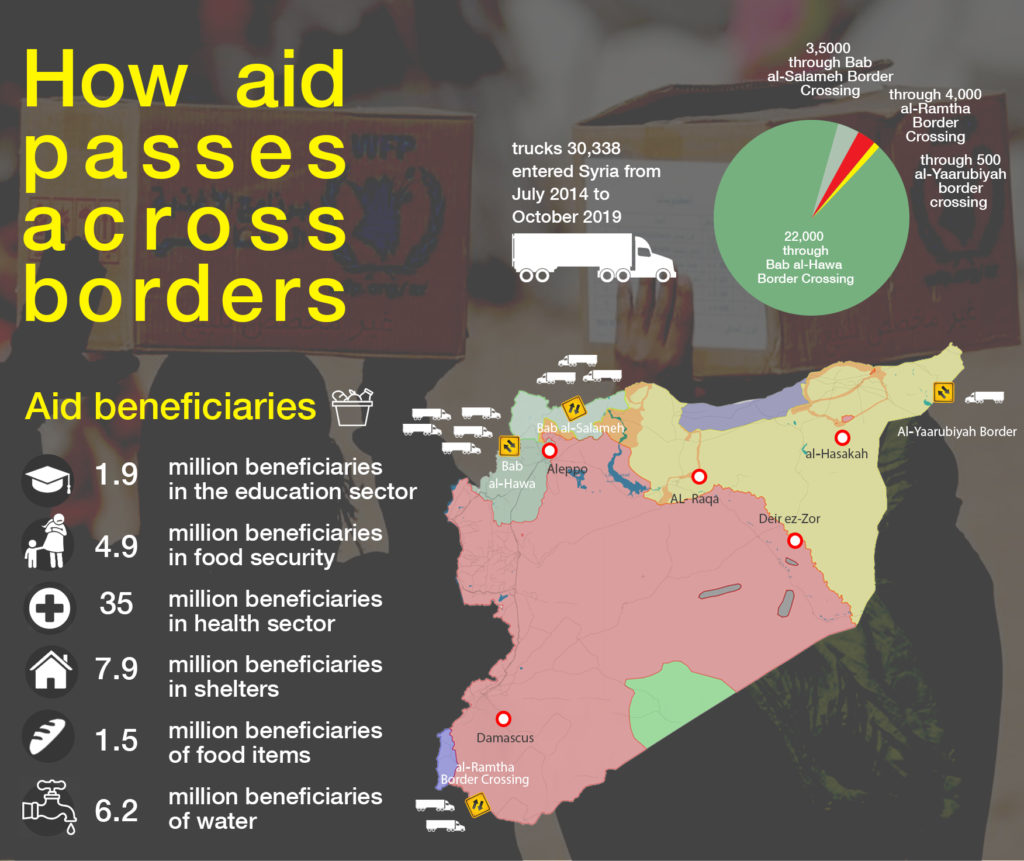
Statistics of the entry of international aid across the border into Syria from July 2014 until November 2019
Source: OCH
Russia’s interest in Syria
Security Council Resolution against “Veto”
The Security Council’s resolution to deliver cross-border aid was issued in 2014, “given the magnitude and complexity of the Syrian crisis and the urgent need to find alternative ways to provide humanitarian aid inside Syria,” according to OCHA’s website.
The Syrian Cross-Border Humanitarian Fund, funded by a number of donor countries, enables all partner organizations in the relief field, especially Syrian organizations, to expand, support and provide humanitarian aid across the Syrian borders and borderlines.
The Fund is mainly aimed at providing predictable, consistent and timely resources for partners, thereby broadening the scope of the delivery of humanitarian aid to support and maintain life-saving activities, focusing on the most urgent needs and filling critical gaps, led by the Deputy Regional Humanitarian Coordinator.
| Resolution No. 2165
It was issued in July 2014, through which the United Nations agencies and their partners were authorized to use the transit routes of borderlines and the border crossings of Bab al-Salameh, Bab al-Hawa, al-Yaarubiyah and al-Ramtha, in addition to the crossings that they already use, in order to ensure the arrival of humanitarian aid, including medical and surgical supplies, to the needy people across Syria through the shortest ways, “with the notification of the Syrian authorities about this.” |
Russia has not hidden its opposition to the text and contents of the resolution since the start of its implementation, but its use of the “veto” to suspend it in December 2019 represented a “precedent” that imposed a new “gravity” on the future of the resolution.
The suspension of cross-border aid and their handing to the Syrian regime gives the regime an economic and military power and a pressure card on opposition-controlled areas, by restricting the materials that are allowed to enter, thereby increasing its ability to resume battles, to regain control over lands it does not control. This is what Russia considers of great importance and, as stated by the Minister of Economy of the “Syrian Interim Government”, Abdel Hakim al-Masry, to Enab Baladi.
This is because the Russian presence in Syria and its support for the regime represent a “sharing of power with the United States,” according to al-Masry, who added that Russia’s presence in Syria means its presence on the Mediterranean, and its military and economic presence in the Middle East. Russia will thus not accept to abandon the region as it is its only outlet to the warm sea.
Russia has been associated with its economic investments with the Syrian regime, i.e. phosphate contracts and the lease of Tartus Port for a period of 49 years, in addition to its intention to establish a joint central bank, which makes abandoning the regime not easy, as the Minister of Economy put it.
In the same vein, director of the Syria Justice and Accountability Centre (SJAC), Mohammad al-Abdallah, pointed out to the importance of the Syrian file to Russia, which is used as a means to lead the international community as a prime source of international resolution, describing Russia’s use of the veto as a way to “show off.”
“Inaction” and “moral discrepancy” … Where are the UN principles?
The United Nations is caught in the dilemma of helping the needy and adhering to the international law that stipulates respecting the sovereignty of the legitimate state, which has made the organization vulnerable to criticism and repeated accusations while trying to help people in conflict areas around the world.
| Three ways to deliver humanitarian aid in Syria:
-Transporting aid to the needy in the regime-controlled areas through Damascus. -Transporting aid through the crossing lines between besieged areas, such as Rukban camp. -Transporting aid through borders without the regime’s approval. |
The United Nations is trying to adapt to the facts on the ground in order to follow up its tasks, which raised expectations about the organization’s ability to deliver aid across the regime-controlled areas, in case anyone decides to stop its passage through the border crossings.
It was reported that in April 2019, the United Nations Office for the Coordination of Humanitarian Affairs (OCHA) discussed transferring the decision to deliver humanitarian aid to Damascus, “to cut off the administrative costs paid by its offices.”
The UN’s personnel in Turkey and Jordan are estimated at more than 40.000, who was hired to manage the entire response program dedicated to Syria, at a cost that exceeded $ 6 million in 2017.
However, the donor countries and humanitarian organizations objected to this proposal; a decision that was beneficial to the Syrian regime and its efforts to hinder relief efforts in the country.
The United Nations, which considers the Syrian regime the legitimate representative of the state, is “stuck” in its bureaucratic and legal procedures, according to al-Abdallah.
Therefore, the United Nations does not see a problem in cooperating with the Syrian government, nor does it consider al-Assad’s rule as the main cause of the Syrian people’s crisis, according to al-Abdallah, who noted that the international institution has referred all issues of human rights violations and crimes, which the Syrian regime is accused of committing, to separate investigative committees.
Al-Abdallah indicated that this bureaucracy contributed to the deterioration of the humanitarian situation in Syria, as the United Nations bases its view of the facts on the ground on recorded data that classifies the Syrian regime as “the legitimate ruler of Syria.”
However, this “legitimacy” will not impose a new political reality in favor of the Syrian regime, with which most Western countries have cut diplomatic ties since al-Assad decided to employ the security and military approach to repress the demonstrators, who demanded reform since 2011. Thus, the regime’s scope of international relations is limited to the United Nations only, according to al-Abdallah.
Tightening and harassment
The Syrian regime “Guard of Aid Gates”
The United Nations agencies and international humanitarian organizations have worked with the Syrian government since the beginning of the conflict to meet the increasing humanitarian needs of victims. However, the organization has sunk into bureaucracy and manipulation.
According to documents obtained by the SJAC, Human Rights Watch (HRW) found out that the government of the Syrian regime has put in place a political and legal framework that allows it to divert UN aid resources, transferred through the authorities’ routes, to finance the regime’s military actions while taking advantage of the UN aid to punish civilians, who are considered by al-Assad as oppositionists, and reward those who are loyal to the regime or can serve its interests.
The documents included information regarding the interference of the Syrian intelligence’s branches with the distribution of aid entering through the regime’s routes, based on political considerations rather than security or humanitarian needs.
The regime also obliged humanitarian organizations to submit projects to the government for approval, often refusing for “vague and arbitrary” reasons, while preventing them from conducting a full assessment of the region’s humanitarian needs, and restricting their access to some areas, in addition to forcing them to obtain permission from the Ministry of Foreign Affairs for every field visit. Hence, these requests are often rejected or left unanswered without providing reasons.
| The United Nations has identified nine points explaining the reasons behind the obstruction of its humanitarian work in Syria since 2019:
-Denying the organization access to those in need. -Reducing the ability of international humanitarian organizations to carry out humanitarian operations across borders. -Obstructing and restricting the work of local and international organizations in delivering aid through contact points inside Syria. -Armed conflict hindering humanitarian operations. -Security and political threats to staff, institutions and humanitarian allocations. -External interference by the government, opposition groups, or other countries in implementing humanitarian action. -The existence of mines and explosive remnants. -Geographical obstacles to the delivery of humanitarian aid, including destroyed infrastructure. -Obstructing the population’s access to humanitarian aid. Source: United Nations Office for the Coordination of Humanitarian Affairs (OCHA) |
The Syrian regime government is also taking advantage of its authority to issue visas for international staff, as a way to pressure humanitarian organizations and agencies, and to detain or delay visas until the organization concerned complies with its demands.
The Syrian Ministry of Foreign Affairs, in cooperation with the Ministry of Social Affairs, provided a list of partners, which has been already approved by both ministries, according to the documents provided by the SJAC. The list includes only the organizations that have been audited and approved by the Syrian security branches, which engage with local partners regularly and can also access lists of beneficiaries and their programs at any time.
Media and human rights reports talked about the Syrian government’s interference in the type of relief materials entering the areas of its control while preventing the passage of medical materials to those in need.
Foreign Policy revealed in 2016 that the United Nations allowed the Syrian government to amend its report on humanitarian needs, and delete the expressions of “besieged” areas, which was considered as a way to “manipulate the documentation of the facts related to the war in Syria.”
Serving the regime’s interests and suffocating the opposition …Is there an alternative?
Humanitarian needs in Syria are increasing year after year, with the ongoing violence and economic effects of the conflict; i.e. the rise of inflation rates, dragging 83 percent of the Syrian population under the poverty line. Thus, the entry of aid to Syria is of great importance to the regime, reflects a positive impact on its economy. That is to say that the regime is securing either a share of foreign currency in its safe or a percentage of relief items.
The delivery of financial aid through neighboring countries or relief items through the regime-controlled areas has worked for the advantage of the Syrian authorities, according to the statements of Abdel Hakim al-Masri, Minister of Economy in the Syrian Interim Government, to Enab Baladi.
Foreign currency and supplies
The Syrian regime has admitted to benefiting from the delivery of aid during previous years. Such a statement was made by the regime’s president, Bashar al-Assad, during an interview with the Syrian News channel on October 31, 2019, when he spoke about the entry of foreign currency to Syria.
The regime also benefited from the UN aid by purchasing supplies of low-cost food aid from some smugglers in the opposition-held areas, which led to lowering the prices and lessening the crisis in the regime-controlled areas.
Al-Masri conveyed that the relief materials, if transferred to the areas of the Syrian regime, can help reduce prices and curb imports, which would lead to a decrease in the need for foreign currency; thus improving the economy, even in a slight way, according to the quantities of foreign currency entering the country.
However, the quantities of aid items distributed to the opposition-controlled areas have recently decreased and no longer have a significant impact, according to the assessment of the Minister of Economy, who added that the utility of foreign currency has also decreased, as the salaries of employees working in international organizations have been converted to the Turkish lira.
On the other hand, al-Masri expects that ending the delivery of aid via the opposition-controlled areas will have a “negative” impact on the economy of those areas, because a large number of families depend on aid, i.e. 80 percent of the total population is benefiting from relief products, according to the statistics released by the Response Coordination Team.
Hindering the passage of aid through the northwest regions will lead to higher prices, especially the prices of imported materials entering via Turkey, with a large number of workers in this sector shutting down their activities in the opposition-controlled areas; thus leading to high rates of unemployment, as al-Masri put it.
Caesar Act is ineffective
The Syrian opposition celebrated the US issuance of the “most significant” penal code against the Syrian regime, in an attempt to repel the Syrian authorities’ continued attempts to promote its “victory” and its call for the resumption of diplomatic and economic relations with the international community.
The Caesar Act, which was approved on December 12, 2019, targeted all foreign supporters, who backed the Syrian regime financially, militarily and technically. However, the law provided a “wide exception” to relief work, explained Mona Jundi, lawyer and member of the Political Bureau of Americans for a Free Syria organization, to Enab Baladi, noting that this was a condition for accepting and passing the law.
However, the director of the Syrian Legal Development Program, Ibrahim Olabi, believed that this exception does not guarantee the continuation of relief work in a proper way, as international organizations and governments may be intimidated by this law and stop providing aid in order to avoid being punished for cooperating with the Syrian regime.
In case it ends … Is there an alternative solution?
The extension of the mandate to deliver aid in previous years represented a “temporary victory”. However, the humanitarian organizations keep facing the pressure of political negotiations over renewing this mandate every now and then, which jeopardized the process of transferring aid every single year.
Alternatively, relief organizations can play a “bigger” role, according to the opinion of a humanitarian work expert on United Nations affairs, who spoke to Enab Baladi on condition of anonymity, by entrusting the UN regional offices with leadership and responsibility, while making sure to avoid errors that might be committed by the organizations operating inside Syria, especially in Idlib, which is controlled by the Syrian Salvation Government and Hay’at Tahrir Al-Sham (classified as a terrorist organization). Hence, the situation in Idlib may cause donors to lose interest in pumping funds, leading to the disruption of aid delivery.
The same expert warned that any attempt made by the armed factions to impose taxes or interfere in the work of relief organizations may lead to the cessation of relief activities in the opposition-controlled areas.
A decision made by the United Nations to assume the responsibilities of leading the relief work in Syria would have been of real value as no other international or local organization can undertake such a role the way the UN can, due to the lack of the “international weight” and legitimacy that gives donors confidence to pump funds. On the other hand, coordinating relief efforts is subject to the will and cooperation of the concerned organizations as it can be sustained without UN supervision.
if you think the article contain wrong information or you have additional details Send Correction
النسخة العربية من المقال
-
Follow us :












 IDPs tent in Idlib Governorate - 2019 (PIN)
IDPs tent in Idlib Governorate - 2019 (PIN)





 A
A
A
A
A
A

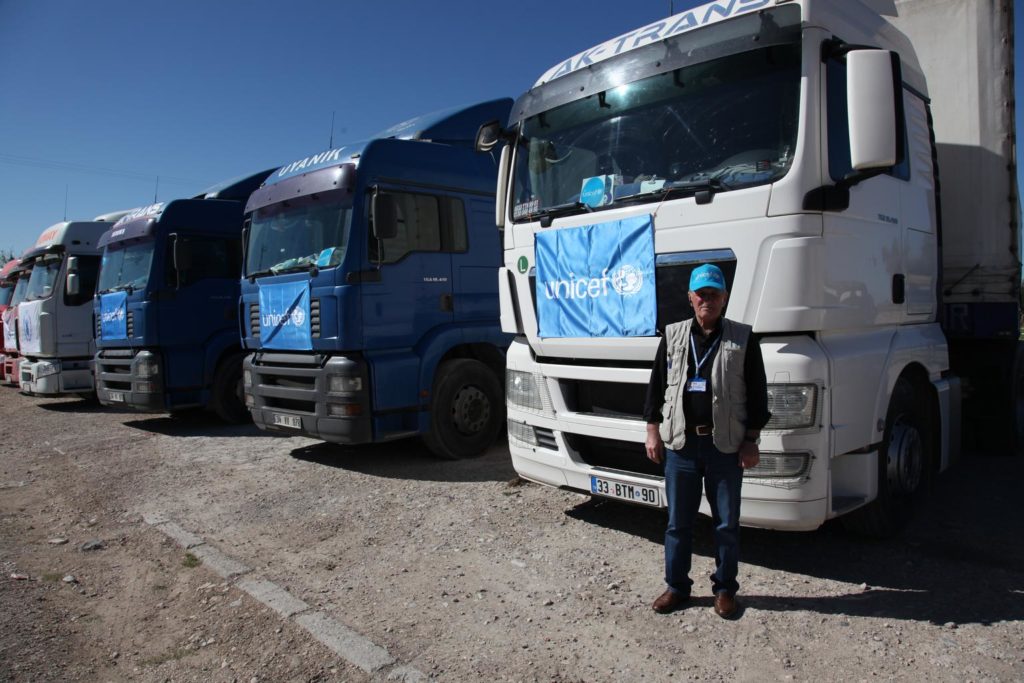
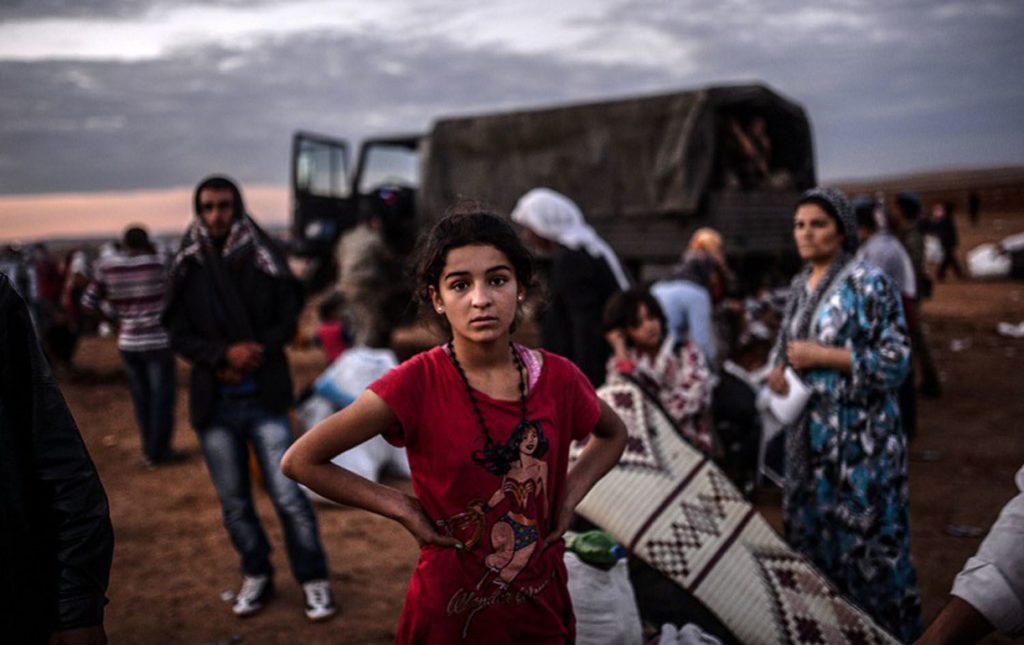

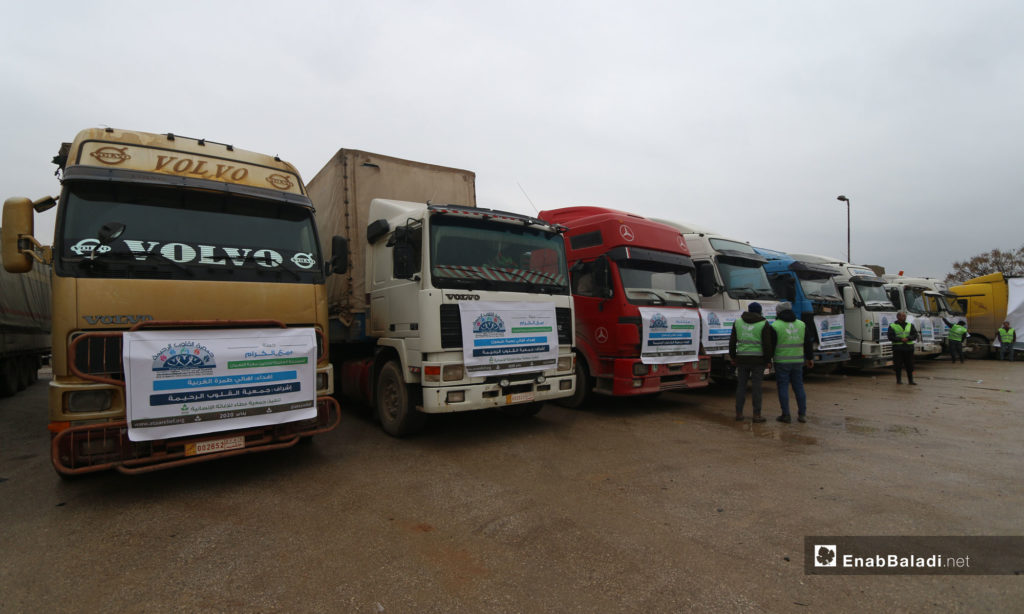
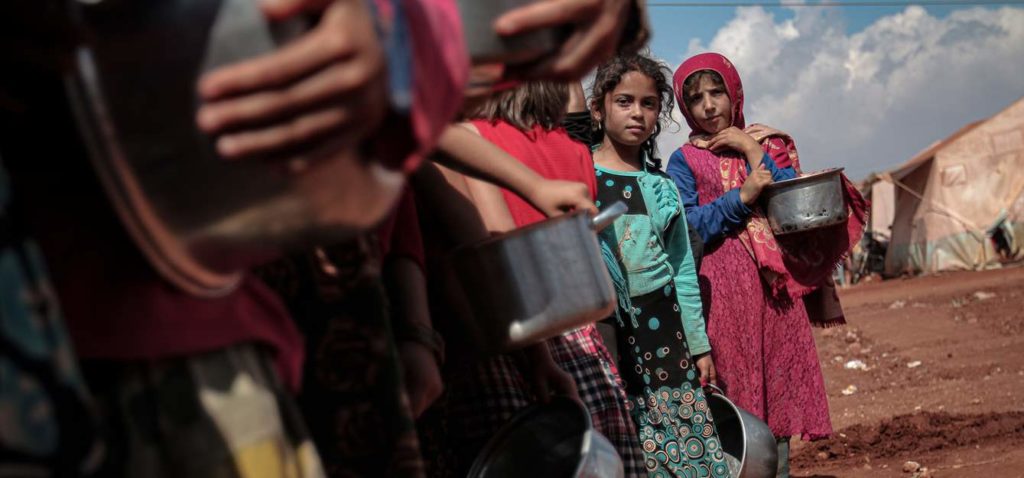


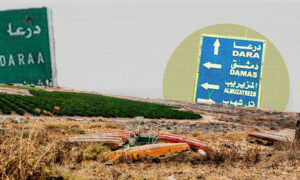
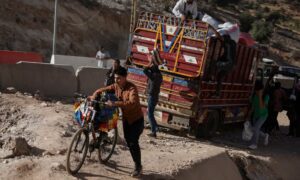


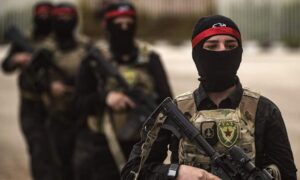
 More In-Depth
More In-Depth